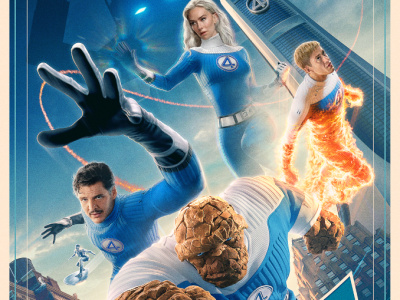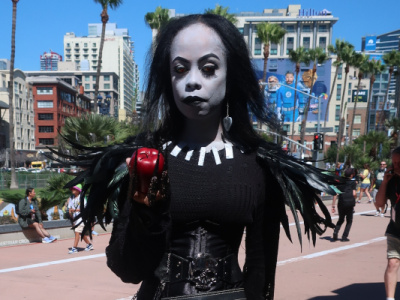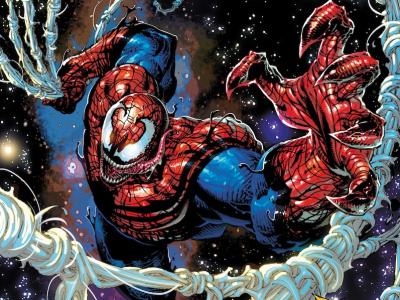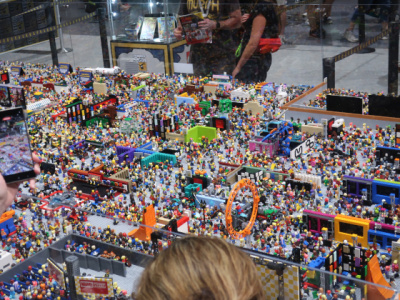ICv2 continues its series of interviews with comic publishers with a talk with Marvel publisher Dan Buckley (who asked VP Sales David Gabriel to join in). In Part 4, we discuss Marvel's classics line, lessons from the death of Captain
You mentioned the Marvel Illustrated titles, which will put you into the library and educational market more deeply than you'd been before. Was that a primary goal?
DB: It was definitely one of the markets we felt it could move in, and we feel it's also going to be a strong product for bookstores. We took a slightly different approach with the classic literature than any of the major publishers have taken.
Last of the Mohicans will be a nice trade paperback when we're done doing that six-issue series. It will be able to get into the graphic fiction section and maybe cross pollinate into a different section of the store. We don't know, but we feel we have a much better chance with some commercial viability by having a product that's closer to an adaptation of that original novel than the traditional Classics Illustrated approach that everyone used to take. It gives it more life, and everyone in the bookstore market is excited about us taking this approach. The library and education market are pretty excited about it, too but the library market was not the only market we thought about when we put this together.
The death of Captain America storyline was a big success--you got killer sales on it. But during that first week when there was lots of demand and retailers didn't have their restocks in yet, there was a lot of pain in the comic stores. What's your takeaway from that overall reaction? Is there anything you would do differently next time?
DB: We'd love to say we'd be able to avoid that at all times in the future. We had a lot of back stock but it took longer to get there than we wanted.
It was a balancing act because we didn't have guaranteed media on this. The story was proposed to us over 18 months ago, and the marketing and the PR aspect came long after. In fact, we took a lot of heat in our editorial meeting for not being as aggressive in its promotion as we probably should have been.
All it would have taken was a big news story to break that day and it would not have happened the way it did. We had a perfect storm--in a positive way: one, Cap being what he is or the American culture or American news stories the way they are today; and two, it was a slow news day. The story started to explode in ways we could not have imagined. Joe and I could not have imagined that we would lose close to five days of work a piece doing media interviews and print interviews.
We did a very heavy overstock of this book, and we got it out as fast as we could. Maybe we'll want to have material further down the pipeline in the future, that's our challenge. How we distributed inventory and moved it around, that may be something we will examine in the future. How we communicated and got the story out, I don't think we'd change much on that end, because if we had leaked it to the retailers, we would have lost all that press. We've heard people say, 'well you should have told us,' but if it got out in the comic book press, CNN would not have carried the story and the Daily News may have dropped it, and then we wouldn't have had what we had. So it's a balancing act, and I think we did the best we could under the circumstances.
One of the more interesting aspects of Webcomics to us is as a place where people can experiment creatively, get quick feedback on how many people are reading it and how readers are responding and then adapt what they do in the future. What are your thoughts on Webcomics as an IP development tool?
DB: They can be a good IP development tool. I've seen what's out there, and it's a lot like the black and white press phenomenon of the 80s. It's a relatively low cost way for people to get out there and make stuff happen and maybe pitch ideas. So yes, creators can create IP with it. But we also have a great way for creating IP in a relatively inexpensive fashion -- all comic publishers do--so I don't see it as being a more advantageous way to create IP than the ways we have already.
For independent press guys, I can understand why they would turn to Webcomics, because it's a lot less risk for them. They still have challenges with distribution and in creating awareness. That's what the hobby shops provide for us--great distribution and great awareness--because the product will get racked and merchandised and get in front of consumers who are willing to spend some money.
Everyone's going to be challenged in how to manage that process. How do you do get people to look at it, get eyeballs on something? In what format are these Webcomics and/or IP development experiments going to happen over the Internet? I think you're going to see some really unique interactions and products come through the market that we don't even know about yet.
Any news on the Spider-Man musical and when that's going to happen?
DB: Not next year. I really can't talk to that since it's not under my purview. I know we're working on it, and I've heard good things about it. I'm sure you'll see official announcements about it in the next couple months.
What do you see as your key opportunities and challenges for Marvel publishing next year?
DB: I have to keep David Gabriel alive (laughs). Pretty much the same thing. I think we've been pretty consistent with our messaging and our goals. In the Marvel Universe, or the Ultimate Universe (our Marvel IP), how do we keep creating stories that are compelling and interesting, not only to our readership, but accessible to new readers? We've stuck most of the landings on most of those things, but we've missed some. And then, how do we explore other opportunities to increase distribution and make it easier for non-comic book readers to come into our world? Those are our biggest challenges, and I see both as being the key parts to helping grow the hobby retail business in a manageable way.
We want more readers in the stores because those are the best places for us to cultivate fans that will buy a lot of product and help support our IP. Both those things work against that objective.
David, do you have anything you want to add?
DG: I just want to continue building retailer confidence in us, which Dan and I have done over the past three years.
My opening statement at the Diamond Summit in
DB: And building more confidence in that we'll listen, and we'll give them an answer. Just like Santa Claus sometimes the answer is no, but they understand why we would say no. I think we are doing a much better job of communicating to the retail community and the fan community on when we're doing stuff and why we're doing it.
We've made adjustments and changes. If we get enough people saying 'you're wrong, please help us,' we try to deal with that. That can be seen from just the simple things like having back stock for reorders, to being a little bit better at having reorder capabilities on specific books and second printings, which helps retailers grow their business. I'm sure there are other things in the day to day business, but we are communicating to retailers, and we're going to keep pushing on that.
Classics, Death of Cap Lessons, More
Posted by ICv2 on September 17, 2007 @ 11:00 pm CT
MORE SHOWBIZ
Showbiz Round-Up
August 4, 2025
The post-SDCC showbiz news is still spicy a week after the show's conclusion. It's time for another round-up!
Early Friday, Continued
August 4, 2025
We continue our coverage of San Diego Comic-Con 2025 with Part 2 of our photo galleries, showcasing photos from early Friday, the second day of the show.
MORE COMICS
'Venom' #252 to Feature Backup Story with New Suit, Plus New Story by DeFalco and Frenz
August 4, 2025
Venom #252 will feature a backup story about Venom’s new suit as well as a backup story by Tom DeFalco and Ron Frenz, the creators of the symbiote suit.
Friday, Continued
August 4, 2025
We continue our coverage of San Diego Comic-Con 2025 with Part 3 of our photo galleries, showcasing photos from later Friday, the second day of the show.







